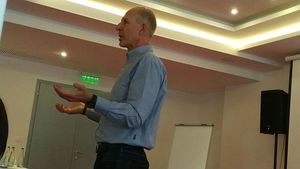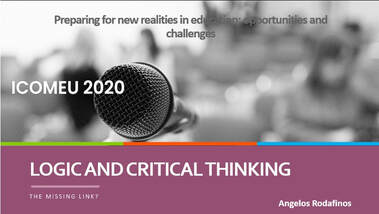Critical thinking and research methods

Background
Are astrology predictions valid? Are vaccines and masks effective? What about homeopathy? Reiki? Chemtrails? Is the Greek language the richest in the world? Are we the smartest?
Why do people believe in something but not in something else? Why can't we change our beliefs, even after new information discredits them? Where do we find reliable answers?
This course will help you develop and improve your logical and critical thinking skills. You will learn to identify cognitive biases and logical fallacies, common obstacles to reason and logic, and to deal with erroneous arguments. You will explore the common sources of knowledge and compare them with the scientific method.
With real-life examples, videos, articles and interactive exercises you will have the opportunity to share ideas and experiences with other participants around controversial treatment methods, false news and urban legends.
Are astrology predictions valid? Are vaccines and masks effective? What about homeopathy? Reiki? Chemtrails? Is the Greek language the richest in the world? Are we the smartest?
Why do people believe in something but not in something else? Why can't we change our beliefs, even after new information discredits them? Where do we find reliable answers?
This course will help you develop and improve your logical and critical thinking skills. You will learn to identify cognitive biases and logical fallacies, common obstacles to reason and logic, and to deal with erroneous arguments. You will explore the common sources of knowledge and compare them with the scientific method.
With real-life examples, videos, articles and interactive exercises you will have the opportunity to share ideas and experiences with other participants around controversial treatment methods, false news and urban legends.
AIM AND OUTCOMES
The aim of the course is to help participants develop and practice the ability of logical and critical thinking.
At the end of the lesson, students will be able to:
1. Understand the value of critical thinking.
2. Learn to spot logical errors and deal with erroneous arguments.
3. To develop skills in finding reliable sources, to be able to critically evaluate knowledge sources and research literature and to distinguish between valid and invalid claims and information.
4. To know the basic principles for planning and conducting scientific research and to understand the complexity of the process.
At the end of the lesson, students will be able to:
1. Understand the value of critical thinking.
2. Learn to spot logical errors and deal with erroneous arguments.
3. To develop skills in finding reliable sources, to be able to critically evaluate knowledge sources and research literature and to distinguish between valid and invalid claims and information.
4. To know the basic principles for planning and conducting scientific research and to understand the complexity of the process.
CONTENTs
False news and pseudoscience examples. Why do people believe in weird things?
Critical thinking and its importance.
Common cognitive errors and misconceptions that hinder logic.
Evaluating of arguments and identifying types of errors.
Common sources of knowledge. Distinguishing between valid and unreliable and between primary and secondary sources.
The stages of scientific research. Examples.
Applying the knowledge and the skills participants learned in selected real life scenarios.
Critical thinking and its importance.
Common cognitive errors and misconceptions that hinder logic.
Evaluating of arguments and identifying types of errors.
Common sources of knowledge. Distinguishing between valid and unreliable and between primary and secondary sources.
The stages of scientific research. Examples.
Applying the knowledge and the skills participants learned in selected real life scenarios.
WHO SHOULD ATTEND
The program is designed for students and teachers, parents, employees and managers. Any individual who seeks to better understand the world, themselves and others, and learn valuable skills to identify rational from irrational arguments and claims and make better decisions.
TESTIMONIALS
- The worst part of the seminar was … the break! -Ν. Anthopoulos
- Angelos is particularly talented and teaches truths that are hard to tell, in a most incredibly enjoyable και and effective manner! I highly recommend you attend his training seminars. –I. Paparoussi, ΜΒΑ, Corporate Trainer - Managing Director at Leaders Lab -Consultant at RogenSi
- Thank you for the great talk today, inspired by the even greater book! –T. Raonic, Education Consultant, Higher Education, McGraw-Hill
- Your humour is contagious! I'll only tell you this: when I came I felt 4 to 5 on your mood scale (terrible) and when I left I was at 1 (extremely happy)! Thank you very much for this! –A. Tzanis, TEAM LEADER, Respite & Brokered Services Program, Coordinated Care & Training Unit, Australian Greek Welfare Society
TRAINER BIO
Prof. Angelos Rodafinos is a Behaviour Change Specialist, an Author and a Keynote speaker. His education includes degrees from Aristotle University Greece (BSc), Ithaca College, New York (MSc), and Wollongong University Australia (PhD). He has spent the last 20 years working as an Academic Psychologist, including long posts as Program Director Social Sciences for Swinburne Online, Melbourne, Head of the Psychology Department at City College, International Faculty of the University of Sheffield, and as Professional Trainer. Angelos has published more than 40 articles in academic journals, a number of articles in popular magazines, co-authored a book on HR management, and written two popular psychology books (‘Idiots are invincible’ and ‘Prince to frog and vice versa’) on problem solving, stress and change. Dr Ro is a professional speaker on topics related to stress, time and change management, customer service, success and happiness. He has invested a lot of effort to inject humour and fun into his presentations and books to assist people to learn and grow while enjoying the process. He shares his summers between Australia and Greece, and enjoys snorkelling, basketball, tennis, and bike riding.
Read more here.
Read more here.
RELATED ARtiCLE: How to deal with Disinformation & advance Critical thinking
A business case
Problem
Distrust in science, pushback against scientific evidence threatens public health around the world. Ignorance can be fatal. Bogus remedies, myths and fake news about COVID-19 can cost lives (Nature).
There is a gap between public opinion and the scientific consensus.
Fake news can damage the public trust in government. The largest category of false or misleading posts is content that deliberately challenges policies and actions of public officials, governments, and international institutions (UN).
School children lack training in critical thinking skills.
Solutions (short, mid, and long term):
Problem
Distrust in science, pushback against scientific evidence threatens public health around the world. Ignorance can be fatal. Bogus remedies, myths and fake news about COVID-19 can cost lives (Nature).
There is a gap between public opinion and the scientific consensus.
Fake news can damage the public trust in government. The largest category of false or misleading posts is content that deliberately challenges policies and actions of public officials, governments, and international institutions (UN).
School children lack training in critical thinking skills.
Solutions (short, mid, and long term):

